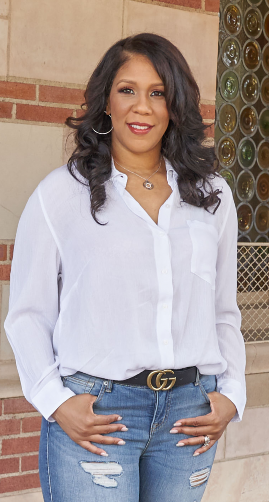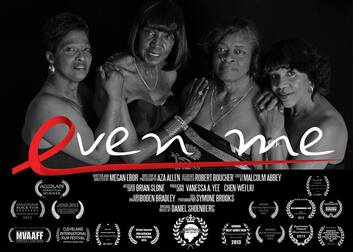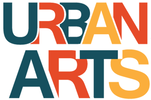 What inspired you to produce documentaries? I was inspired to produce multimedia projects because I wanted to develop intervention programming that was applicable to my community. Documentary film is a medium where voices from a particular community can be represented, depicting their lived experiences. Film is a powerful tool to communicate health information and promote positive health outcomes for marginalized groups. Also, it was important for me to highlight the cultural context of racial and ethnic groups—especially when focusing on historically challenging topics like HIV and sexual health. I use film to translate public health research as a means to disseminate information in order to mitigate health disparities and promote health equity. I could see both professionally and personally how silence around sexual health issues can deepen adverse health outcomes and I wanted to do something about it. I was inspired to produce documentaries in order to engage the community by amplifying the voices from within it [community]. Tell us about the first project, "Even Me". My first project, Even Me, was developed when I was a graduate student at UCLA. I was in the midst of earning my Masters in Social Welfare with a concentration in gerontology, when I received word that my great-aunt had developed neurosyphilis (infection of the central nervous system) due to oversights by her medical provider. Given that syphilis is a treatable infection, I was appalled that it was not treated. As a result my great-aunt’s quality of life was severely diminished until her last days. This incident was the catalyst for the making of Even Me, a short documentary film that highlights the rise of HIV among middle-aged and older adults in communities of color. After the warm reception of the film, I immediately launched my production company, “Reel View Interventions” and implemented the Even Me Outreach Campaign. We toured nationally and internationally to disseminate HIV education among various audiences, partnering with churches, community based organizations (CBOs), universities, hospitals, clinics, film festivals, and other organizations that serve older adults. Even Me was completed in 2012 and has received multiple recognitions and awards. It continues to be used as a tool to provide education and awareness for older adults, emerging and practicing clinicians.  Do you think it’s important for African Americans to control their narrative? Absolutely! Yes, it is very important for African Americans to control our narrative. Storytelling is deeply rooted in our history; it is a necessity in validating the human spirit. There is an African Proverb that states, “Until lions have their historians, tales of the hunt shall always glorify the hunter”. When you live in a country with an extensive history in the subjugation of African Americans and where the erasure of blackness is common-place, it is through the sharing and control of our narratives that we can convey accurate accounts of who we are and the contributions we have made. When we know the truth of who we are we are better equipped to rise above knowing that we are descendants of royalty with unparalleled intelligence, gifts, and talents. Why was getting a PhD important to you? It was important for me to earn my Ph.D. for many reasons. As an African American woman it was important for me to be represented in the spaces that were informing and advancing knowledge in ways that impacts me and my community. Folks have used the term “representation matters” quite frequently as of late. I cannot stress it enough, it is important for young African American girls and boys to have mentors and community members that look like them throughout their education. Oftentimes the academy appears unattainable to young Black and Brown children because of the minimal representation of diverse groups. Our presence in these spaces demonstrates to younger generations that despite your lineage or past challenges, you are deserving, you are intelligent, and you are worthy. Share details on the upcoming debut of your feature film that you directed and produced. My next film project is an educational narrative film entitled, TRY, (an acronym for Translating Research for You) it is a culturally congruent film using entertainment education methods that build upon ongoing research funded by the National Institutes of Health (NIH). The film’s content was informed by a larger study, “Healing our Hearts, Minds and Bodies” (HHMB; funded by the National Heart, Lung, and Blood Institute) and was designed to address the intersecting issues of Black and Latinx people living with HIV, patients’ trauma histories, barriers to care, and cardiovascular disease (CVD) risks. The HHMB trial and curriculum was developed by Drs. Gail Wyatt, Alison Hamilton, and Arleen Brown of the University of California, Los Angeles. The script was written to provide examples of how to use health concepts learned through HHMB and increase uptake of these strategies. There are various problem solving techniques, anxiety and stress reducing approaches, trauma writing exercises, and eating/health strategies to improve cardiovascular health through diet and exercise. Through stories based on real-life events, this film provides a glimpse into the everyday lives of folks living in under-resourced communities with HIV. TRY demonstrates everyday struggles while also providing a visual roadmap showing the genesis of a given problem/trauma and how it manifests over time if it goes unresolved. This film has the capacity to change minds and to foster compassion for people living with HIV as they face multiple layers of adversity—yet manage to find hope to carry on. What is the most challenging aspect of producing a film project? The most challenging aspect of producing a film project is balance. Because I use film to translate research there is a delicate dance that needs to take place specific to storytelling and merging the research in a way that viewers can see the utility of the health promotion strategy and its applicability to their lives. For example, if researchers ask clients to eat healthily in order to improve their cardiovascular health, but the client lives in a food desert— how can we expect for the participant to be compelled to follow through when they are facing environmental/structural obstacles? For me, being a part of a team at the UCLA, Center for Culture, Trauma, and Mental Health Disparities, we engage in community-based research, we partner with CBOs to help mitigate these barriers. It is not always easy to depict realistic ways to implement various health concepts through film when the social determinants of health are not conducive to positive health outcomes particularly among marginalized groups. However, taking a first step in the areas that one can control is always a positive way to encourage participants that are facing tremendous barriers. What advice do you have for someone who seeks to produce a documentary or film? I use film in my research for the purposes of health promotion. I believe that there are certain concepts that are better understood through visual arts. So my advice would be to collaborate with media professionals, work on projects that you feel passionate about, do not follow hot topics or trending research— make films that no one else cares enough to make. I am motivated by effecting change in my community in ways that speak to us and film is one of the multi-media platforms that can address various learning styles and evoke emotion to encourage behavioral change. Follow us @ IMDb
2 Comments
LaWanda Gresham
12/20/2020 11:28:12 am
Thank you Dr. M. Ebor for being a light into our fight for Equality 💖
Reply
Dr. Ebor
12/23/2020 06:02:02 pm
Ms. Gresham,
Reply
Leave a Reply. |
HoursM-S: 7am - 9pm
Tours on Tu&Sa |
Telephone214-702-3371
|
|
